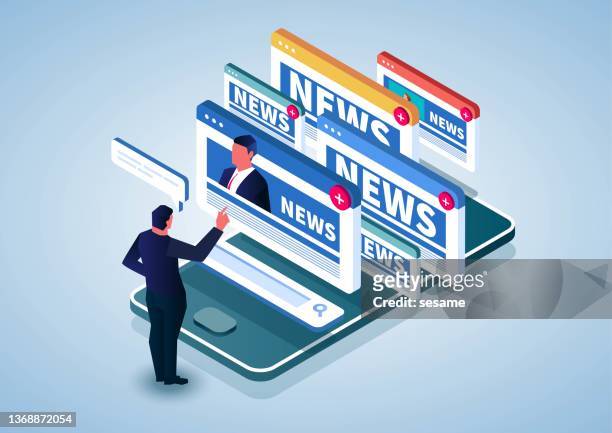The Beginner’s Guide to stnews.live Features
Wiki Article
The Value of Fact-Checking worldwide of News Online
The occurrence of misinformation in today's on the internet news landscape has gotten to startling degrees. Fact-checking companies play a necessary function in combating this fad. They confirm cases and enhance the reliability of journalism. However, the performance of these companies often depends upon their methods and public understanding. As audiences browse this intricate atmosphere, the ramifications of their findings might form the future of news consumption and trust fund. What does this mean for the honesty of information progressing?
The Surge of Misinformation in the Digital Age
Exactly how has the introduction of electronic technology contributed to the spread of false information? The rapid growth of the net and social media systems has promoted the dissemination of information at an unprecedented pace. Individuals can share articles, videos, and opinions with a mere click, usually without validating the content's precision. Algorithms focus on spectacular or emotionally charged product, leading to a spreading of deceptive narratives that capture focus.Additionally, the privacy afforded by electronic platforms allows individuals to spread false details without responsibility (stnews.live). False information grows in echo chambers, where users are exposed largely to perspectives that reinforce their ideas, even more entrenching fallacies. The saturation of details can overwhelm users, making it testing to recognize trustworthy sources from undependable ones. Subsequently, false information has come to be a pervasive concern in the electronic landscape, affecting popular opinion and count on reputable news sources
The Function of Fact-Checking Organizations
Fact-checking companies play an important duty in enhancing the reliability of journalism by confirming claims made in report. Their efforts are vital in combating misinformation, making certain that accurate information prevails in the electronic landscape. By holding media outlets responsible, these organizations add considerably to notified public discourse.Enhancing Trustworthiness in Journalism
While false information proliferates in the digital age, fact-checking organizations play an important duty in boosting the trustworthiness of journalism. These companies meticulously verify insurance claims made in newspaper article, public statements, and social media posts, ensuring that info disseminated to the public is accurate and trustworthy. By supplying independent assessments, they work as a vital source for journalists, helping them keep high criteria of integrity. Additionally, their initiatives promote openness in media, fostering public count on. As audiences end up being increasingly discerning, the existence of reputable fact-checking entities can distinguish trusted news resources from those that may spread falsehoods. Eventually, the dedication of fact-checking companies to support reliability is important for the health and wellness of democratic discourse.Combating False Information Successfully
As false information remains to spread out rapidly across digital platforms, the role of fact-checking companies becomes significantly vital in the fight for exact info. These companies act as guard dogs, inspecting claims made by somebodies and media electrical outlets to ensure liability. By utilizing rigorous study techniques and specialist analysis, they confirm realities and make clear deceptive narratives. Their findings are distributed through numerous networks, enlightening the general public and promoting important reasoning. Furthermore, partnerships with social media platforms enhance their reach, enabling for prompt flagging of incorrect info. As electronic literacy expands, the influence of fact-checking companies is vital in equipping target markets to discern fact from falsehood, inevitably adding to an extra educated culture.Just How False Information Affects Public Understanding
Misinformation significantly undermines count on media, leading target markets to wonder about the credibility of news sources. Consequently, individuals usually move in the direction of electrical outlets that strengthen their existing ideas, adding to the polarization of opinions. This dynamic produces a fragmented info landscape, where shared comprehending ends up being significantly difficult to achieve.Rely on Media

Count on media has ended up being progressively breakable in the digital age, where the fast spread of false details can skew public assumption. As false information proliferates throughout social networks and on-line platforms, audiences often discover it challenging to determine legitimate resources from unreliable ones. This uncertainty cultivates apprehension, leading many individuals to question the intentions behind news reporting. As a result, depend on in established media outlets has actually diminished, as customers increasingly transform to different resources that may do not have strenuous content requirements. This erosion of trust fund not just impacts specific beliefs yet likewise threatens the cumulative ability to engage in educated conversations. Eventually, the integrity of journalism goes to stake, highlighting the vital requirement for reliable fact-checking to recover confidence in the media landscape.

Polarization of Viewpoints
The raising apprehension towards traditional media has actually added to an expanding polarization of viewpoints amongst the general public. False information, commonly distributed through social media sites and on-line systems, plays a substantial function in forming distinct ideological separates. Individuals regularly look for out info that aligns with their pre-existing beliefs, strengthening their perspectives while rejecting opposing perspectives. This echo chamber impact magnifies departments, bring about a fragmented public discussion where agreement becomes progressively elusive. Additionally, sensationalized stories thrive in this atmosphere, additionally skewing public understanding and fostering wonder about in credible resources. As polarization rises, the need for efficient fact-checking comes to be critical to bridge spaces and advertise informed conversations, inevitably making certain a more natural society efficient in steering intricate issues.Strategies for Reliable Fact-Checking
Reliable fact-checking depends on an organized technique that includes complete research, confirmation of resources, and essential evaluation of insurance claims. A fundamental technique is cross-referencing information from several reputable sources to verify its accuracy. Fact-checkers commonly use specialized data sources and archives to trace the origin of certain declarations, making certain that the reported information lines up with documented proof.An additional important approach includes inspecting the context in which insurance claims are presented. Deceptive details can arise from out-of-context quotes or discerning information usage. By taking a look at the wider story, fact-checkers can identify potential predispositions or false impressions.
Moreover, engaging with experts in relevant fields can give clarity and insight that improves the fact-checking procedure. This collaboration can discover subtleties that laypeople might neglect - stnews.live. Inevitably, a disciplined strategy combining these strategies view website promotes a more educated public, boosting the dependability of info distributed in the digital age
The Effect of Social Network on News Consumption
How has social media changed the way individuals take in news? The emergence of platforms like Facebook, Twitter, and Instagram has especially transformed news usage patterns. News is now distributed rapidly, permitting users to gain access to real-time updates and engage with content via likes, shares, and comments. This immediacy has fostered a choice for bite-sized information, usually at the expense of comprehensive evaluation.Moreover, social media sites allows customized news feeds, where algorithms curate web content based on individual preferences, producing resemble chambers that might limit exposure to diverse perspectives. The function of standard news electrical outlets has actually reduced as people progressively rely on peer referrals and trending subjects. The credibility of details is usually jeopardized, as sensationalism can eclipse factual coverage. Overall, social networks has reshaped news intake, emphasizing speed and personalization while testing the standards of journalistic stability.
Empowering Audiences to Determine Reputable Sources

Furthermore, taking a look at the authorship and business background read this article of news short articles can reveal potential predispositions. Cross-referencing info across numerous trustworthy outlets better boosts the confirmation procedure. Using digital devices, such as browser extensions that rate the integrity of sites, can also help in recognizing credible info. By proactively engaging with these sources and cultivating a vital attitude, audiences can better equip themselves to determine trustworthy news sources, eventually cultivating an extra enlightened society amidst the intricacies of today's media environment.
The Future of Journalism and Fact-Checking
As the media landscape advances, the future of journalism and fact-checking encounters both challenges and chances. The increase of electronic platforms has democratized details dissemination, allowing diverse voices to arise. However, this has likewise resulted in the expansion of false information, requiring durable fact-checking systems. Journalists will progressively count on innovation, including AI tools, to validate facts swiftly and successfully.Partnership between news organizations and fact-checking entities is prepared for to enhance reliability and transparency. Moreover, audience involvement will play a crucial function, as informed viewers come to be considerable partners in identifying reliable content.
The demand for responsibility and accuracy is likely to expand, pressing reporters to maintain high criteria in their reporting. Inevitably, the future of journalism might depend upon its ability to adjust to technical advancements while maintaining journalistic honesty, ensuring that fact-checking stays a keystone of credible news.
Often Asked Questions
How Can I Report Misinformation I Come Across Online?
To report false information come across online, people can utilize platform-specific coverage devices, supply clear evidence, and share the info with fact-checking companies. Engaging with community discussions can likewise aid raise understanding about the false information.What Are Typical Indications of Misinformation in News Articles?
Usual indications of misinformation in newspaper article include sensational headlines, absence of credible sources, psychological language, irregular realities, and absence of writer credentials. Readers should critically review content for these indications to discern accuracy.How Do Fact-Checkers Confirm Sources?
Fact-checkers verify resources by cross-referencing information with trustworthy databases, getting in touch with specialists, and checking out the original context of claims. They likewise analyze the integrity of the resources, guaranteeing accurate and trustworthy details for public usage.What Legal Actions Can Be Taken Against Misinformation?
Lawsuits against misinformation might consist of disparagement lawsuits, cease-and-desist orders, and regulative charges. Targets can prosecute via civil courts, while some jurisdictions enforce fines or assents on systems distributing false details.Are There Apps for Fact-Checking News On-The-Go?
Countless apps exist for fact-checking news on-the-go, consisting of Snopes, FactCheck.org, and PolitiFact. These applications aid individuals validate insurance claims quickly, advertising educated decision-making find more info and promoting an extra discerning method to consuming news in real-time.Report this wiki page